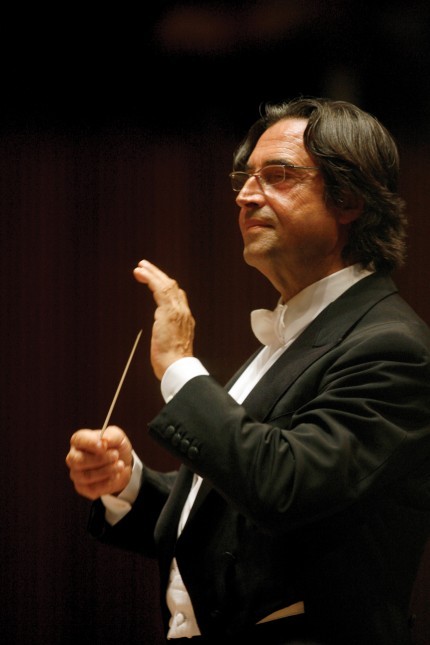With storm clouds on the horizon, CSO closes opening week with Italian flavor

There was clearly an attempt to create some light-hearted joie de vivre for the Chicago Symphony Orchestra’s annual Symphony Ball concert. The formally dressed audience had their photos taken on the red carpet outside the hall on Michigan Avenue Saturday night while a brass quintet attired in red-and-white-striped Italian livery played waltzes and polkas to greet the evening’s glitterati.
But even on a perfect fall evening, there were storm clouds on the horizon in this final event of opening week of the CSO’s 125th anniversary season. Surrounding the brass quintet were orchestra members dressed for the evening’s concert, distributing flyers asking concertgoers to “stay connected with the Musicians of your Chicago Symphony Orchestra,” with Facebook, Twitter and website information (ChicagoSymphonyMusicians.com). It’s hard to avoid the feeling that—as was the case three years ago—the musicians agreed to perform the opening week of concerts, and now were battening down the hatches for an impending strike and PR battle with management. When asked about the situation, a CSO spokeswoman only repeated the mantra of the past week that negotiations were ongoing.
Saturday’s program offered typical gala/fund-raising fare with a crowd-pleasing warhorse, the Mussorgsky-Ravel Pictures at an Exhibition, paired with two Italian-themed works for an unbroken 105 minutes, designed to please the crowd and get then quickly out to dinner at the Palmer House.
The evening kicked off with a genuinely rare event—Riccardo Muti conducting a 20th-century American work. John Corigliano’s Campane di Ravello was written for the CSO in 1987 to mark Sir Georg Solti’s 75th birthday. Inspired by the composer’s trip to the Italian town on the Amalfi coast–which also happens to be Riccardo Muti’s birthplace—Corigliano’s brief curtain-raiser cleverly melds gently discordant tolling wind and brass chords into an off-center fanfare in which strains of “Happy Birthday” gradually emerge from the hurly-burly. Muti led the musicians in a well-balanced performance in this, the first of several CSO world premieres to be played in a retrospective look back this season.
Like Corigliano, Sir Edward Elgar also found musical inspiration in a vacation to Italy, even though the weather on his trip was as gray and wet as that he left behind in his native England.
At 22 minutes, Elgar’s concert overture In the South (Alassio), the souvenir of his Mediterranean travel, is closer to an extended tone poem. Big in scale, there are several varied episodes reflecting religious pilgrims, the heavy tramp of past Roman legions, and Italian song. Still, the dominant voice is Elgar through and through in the score’s bristling energy and rich, restless lyricism. (The CSO gave the American premiere of In the South in 1904, just months after Elgar conducted the first performance in London.)
Muti led the orchestra in a vital and fully committed performance, without quite convincing that the CSO’s musical director is a natural Elgarian. The opening flourish lacked sweep and sumptuousness, lyrical episodes were drawn out a bit too lovingly and the final bars felt heavy-footed and awkward when the music should soar. Muti handled Elgar’s contrasting episodes fluently, however, and the orchestra played superbly. Violist Li-Kuo Chang rendered the central “Canto popular” solo with sweet yet unsentimental tone, nicely echoed by hornist Daniel Gingrich.
Pictures at an Exhibition likewise received a sturdy and fully characterized reading, even if the results were neither as polished nor as compelling as one would expect from this partnership. There were fleeting interpretive oddities, like the bombastic climax to “Bydlo” and the over-measured final peroration of “The Great Gate of Kiev.”
Drama and volume were in stronger supply than charm with “Catacombs” more implacable than atmospheric. Yet there were consistently inspired solo contributions from the orchestra, not least Christopher Martin’s bold, clarion trumpet in the Promenade theme.
Posted in Performances




